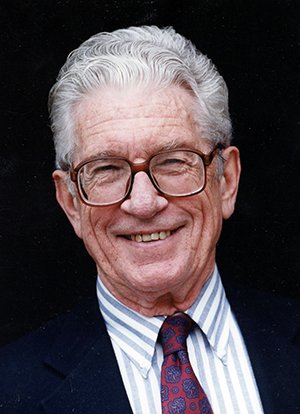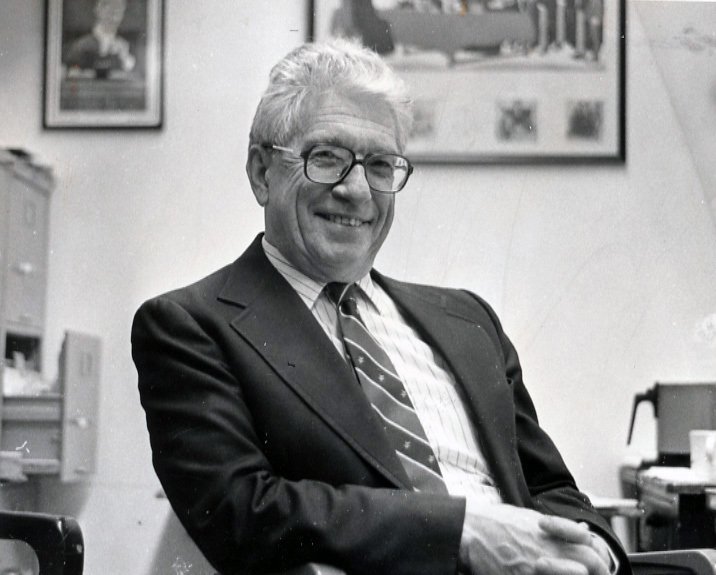In Honor of Emeritus Political Science Professor David G. Smith

President Valerie Smith shared the following message with the campus community on October 17, 2023:
Dear Friends,
With deep sadness, I write to share the news that Richter Professor Emeritus of Political Science David Gilbert Smith died on Thursday, Sept. 28. He was 96.
David, who served on the faculty for 39 years, is remembered as an influential and gracious scholar, mentor, and friend to generations of colleagues and students alike.
David is survived by Eleanor, his wife of 51 years; Alison and Joel Smith and their spouses, Alan Haigh and Rosemary Smith; his stepchildren, Laura Houston and Stan Gergen, and their spouses, Neil Pennington and Lisa Gergen; and five grandchildren.
A memorial service will take place on Saturday, Nov. 11, at 11 a.m. at White Horse Village in Newtown Square, Pa. In lieu of flowers, the family welcomes donations in David’s name to the Chester Children's Chorus or the College’s David G. Smith Internship in Health and Social Policy.
I invite you to read more below about David and his many contributions to our community.
Sincerely,
Val Smith
President
In Honor of Emeritus Political Science Professor David G. Smith
Richter Professor Emeritus of Political Science David G. Smith died Thursday, Sept. 28, at age 96. With his passing, Swarthmore has lost an influential national expert on health care policy, as well as a warm and generous colleague and mentor. A committed scholar, Smith continued his research and writing long after he retired.
“His work in the field of health policy stands as a model of research in policy studies,” says Richter Professor of Political Science Tyrene White. “As I made the transition to Swarthmore, I recall the many ways in which he was helpful as I developed my first courses and found my place in the department.”
Given the influential role he played in shaping her interests and teaching, Centennial Chair of Economics Ellen Magenheim says she is surprised to recall that Smith retired more than 30 years ago.
“I have tremendous gratitude for David's willingness to teach me so much,” says Magenheim, who sat in on Smith’s health policy lectures early in her career. Though they only overlapped briefly on the faculty, she says: “The way I teach health economics is heavily influenced by what I learned from David, and I always recognize the importance of embedding the economic theory in the rich institutional frameworks I first learned about from him.”
Smith grew up in Norman, Okla., and graduated with a B.A. (1948) and M.A. (1950) from the University of Oklahoma, where his father was on the faculty. He then earned a Ph.D. from Johns Hopkins University and, following a postdoctoral fellowship at the London School of Economics, joined Swarthmore’s faculty as a political science instructor in 1953.
At Swarthmore, his courses included Public Administration, Constitutional and Public Law, and Health and Welfare Policy.
A prolific scholar, Smith wrote four books about Medicare and Medicaid reform, including Medicaid Politics and Policy (2015) with Judith Moore, the definitive history of this vital program, now in its second edition. Early in his career, he wrote two books on political science and constitutional law, including one with longtime political science professor J. Roland Pennock ’27.
A former fellow of the Rockefeller Foundation, Carnegie Corporation, and Brookings Institution, Smith worked under grants from the Bureau of Health Services Research, the Robert Wood Johnson Foundation, and the National Science Foundation to study the politics and history of Medicare and Medicaid. During the Clinton administration, he consulted on the Clinton health care plan as an expert in “entitlement politics,” the title of his 2002 book. He also wrote on the children’s health insurance program, or CHIP, Pennsylvania's program to provide health coverage to uninsured children and teens who are not eligible for or enrolled in Medicaid.

“His work in the field of health policy stands as a model of research in policy studies,” says Richter Professor of Political Science Tyrene White of Smith.
Smith frequently collaborated with his friends and colleagues on campus. Those collaborations include a project, “Decision Making in Health, Education, and Welfare,” with political science colleague Charles Gilbert, and work on policymaking in the social services with historian and Swarthmore College President Robert Cross. In 1973, Smith cosponsored a bioengineering course that studied pacemakers, vascular disease, and trauma with professors in engineering and biology; he led the public policy discussion.
Smith’s commitment to the College was deep.
In addition to his teaching and research, Smith chaired the Special Committee on Student Life, one of the three major study groups appointed by President Courtney Smith in 1965. He also chaired the Political Science Department from 1970 to 1987.
Smith’s service extended beyond campus. He was past chair of the Delaware County Health and Welfare Council as well as a member of the Washington Seminar on Health Policy. He also served as a consultant to the National Research Council of the National Academies and the National Academy of Sciences.
After retiring, Smith maintained a steady presence on campus. He served the College as a pre-law adviser, and continued to work with students who were interested in health care policy. “He remained an avid court follower,” says Richter Professor Emerita of Political Science Carol Nackenoff, “and we talked about particular cases for years.”
“David was emeritus when I arrived, but welcomed me as if he were a fully active departmental colleague,” says Associate Professor of Political Science and Executive Director of the Lang Center for Civic and Social Responsibility Ben Berger. “I found his commitment to scholarship extremely inspiring. Until fairly recently, I would see him on campus as he continued to research and publish.”
Although Professor of Political Science Keith Reeves ’88 was not a student of Smith’s, he enjoyed getting to know him as a colleague and friend.
“Whenever David visited the Political Science Department, I would always hear his chuckle before I actually saw him,” Reeves says. “With a warm, wide grin, he would ask how things were going and what ‘trouble’ we were up to.”
Smith’s legacy will remain a part of the College. When he retired in 1992, friends, colleagues and former students established an internship in his name. For more than three decades, The David G. Smith Internship in Health and Social Policy, a merit-based research grant, has been awarded annually to one student conducting an internship in social policy, with priority given for an internship in the health care field.


